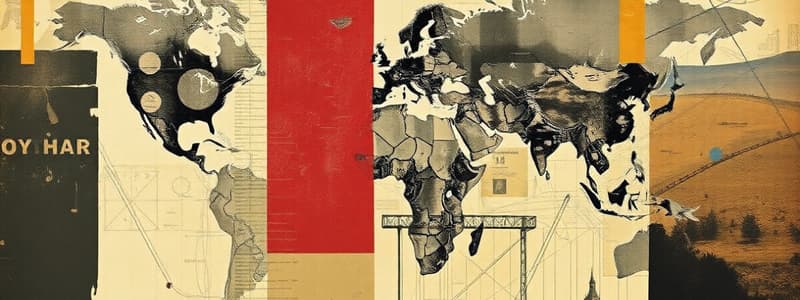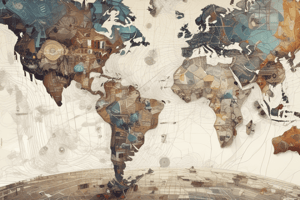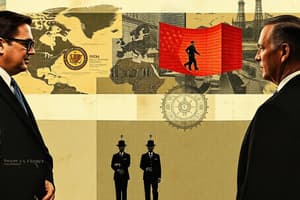Podcast
Questions and Answers
What was a significant factor that contributed to the great divergence between East and West in the nineteenth century?
What was a significant factor that contributed to the great divergence between East and West in the nineteenth century?
- A decline in imperialism by European nations
- Global intensification in the circulation of ideas (correct)
- Reduction in global trade activities
- Increased isolationist policies by European powers
How did Western advancements during the great divergence occur?
How did Western advancements during the great divergence occur?
- Through the dominance of Eastern powers
- Solely through domestic innovations
- Through the emulation of non-Western technologies (correct)
- By avoiding interactions with other cultures
What was one of the key dynamics linked to the great divergence?
What was one of the key dynamics linked to the great divergence?
- The establishment of trade colonies by Asian empires
- An increase in agricultural practices across Europe
- A decrease in global population growth
- Industrialization in the West leading to deindustrialization elsewhere (correct)
Which characteristic became prevalent among states during the emergence of modern international order?
Which characteristic became prevalent among states during the emergence of modern international order?
What role did European powers play in trade during the great divergence?
What role did European powers play in trade during the great divergence?
What is the main characteristic of the contemporary international order?
What is the main characteristic of the contemporary international order?
Which event marks the beginning of the principle of ‘sovereign territoriality’ in historical accounts?
Which event marks the beginning of the principle of ‘sovereign territoriality’ in historical accounts?
Critics of the Westphalian narrative argue that:
Critics of the Westphalian narrative argue that:
According to recent scholarship, when did the modern international order start to take shape?
According to recent scholarship, when did the modern international order start to take shape?
What significant aspect of 'The West' is highlighted in the content?
What significant aspect of 'The West' is highlighted in the content?
Historical accounts tracing international orders often start from which ancient civilization?
Historical accounts tracing international orders often start from which ancient civilization?
How do alternative views of the starting points of international orders differ from traditional views?
How do alternative views of the starting points of international orders differ from traditional views?
What does the notion of 'regularized practices of exchange' refer to in the context of international orders?
What does the notion of 'regularized practices of exchange' refer to in the context of international orders?
What key challenge arose after the collapse of the Soviet Union?
What key challenge arose after the collapse of the Soviet Union?
What characterized the Cold War period from 1944 to 1989?
What characterized the Cold War period from 1944 to 1989?
What was a major focus of the Clinton administration regarding foreign policy?
What was a major focus of the Clinton administration regarding foreign policy?
In the post-Cold War era, how was Europe's political landscape initially perceived?
In the post-Cold War era, how was Europe's political landscape initially perceived?
What was a potential debate surrounding Europe's future after the Cold War?
What was a potential debate surrounding Europe's future after the Cold War?
What was one of the primary issues related to the emergence of former Soviet states?
What was one of the primary issues related to the emergence of former Soviet states?
What was the major security dilemma faced by the superpowers during the Cold War?
What was the major security dilemma faced by the superpowers during the Cold War?
In what aspect did Europe exhibit weaknesses after the Cold War?
In what aspect did Europe exhibit weaknesses after the Cold War?
What was the main economic engine in post-cold war Asia?
What was the main economic engine in post-cold war Asia?
What major event in 2001 marked a turning point in modern international relations?
What major event in 2001 marked a turning point in modern international relations?
Which of the following was a result of the Arab Spring?
Which of the following was a result of the Arab Spring?
What motivated many people from the new global South to migrate to the North?
What motivated many people from the new global South to migrate to the North?
What characterized Obama’s foreign policy?
What characterized Obama’s foreign policy?
What was a consequence of the Third World political project?
What was a consequence of the Third World political project?
What did Trump's foreign policy primarily focus on?
What did Trump's foreign policy primarily focus on?
What was a major criticism of the Bush administration’s war of choice in Iraq?
What was a major criticism of the Bush administration’s war of choice in Iraq?
Which of the following is NOT indicated as a sign of a ‘new’ cold war?
Which of the following is NOT indicated as a sign of a ‘new’ cold war?
What has characterized the rise of nationalist or populist politics since 2008?
What has characterized the rise of nationalist or populist politics since 2008?
According to proponents of an Asian century, what is expected to happen by mid-century?
According to proponents of an Asian century, what is expected to happen by mid-century?
What is one argument against the idea that the 21st century will be Asian?
What is one argument against the idea that the 21st century will be Asian?
Which event is associated with the rise of populism in the US?
Which event is associated with the rise of populism in the US?
What factor do critics argue is necessary to differentiate the current tensions from the Cold War?
What factor do critics argue is necessary to differentiate the current tensions from the Cold War?
Which of the following is NOT one of the criticisms of globalization expressed by populists?
Which of the following is NOT one of the criticisms of globalization expressed by populists?
What is viewed as a challenge to the economic security of countries by populists?
What is viewed as a challenge to the economic security of countries by populists?
Flashcards are hidden until you start studying
Study Notes
Great Divergence
- Occurred between East and West in the nineteenth century, driven by intensified global interdependence.
- European imperialism played a crucial role; powers controlled trade coercively.
- Western advancements stemmed from the fusion of non-Western ideas and technologies.
Emergence of Modern International Order
- Industrialization expanded the world market, leading to increased power accumulation while deindustrializing other regions.
- States were organized by abstract bureaucracies, exerting greater control over their territory's use of force.
- Modern international orders are practices of exchange among politically recognized units, only fully globalized in the last two centuries.
The Concept of 'The West'
- Defined as Europe (especially Northern and Western) and the Americas, particularly the U.S.
- The rise of Western dominance is a recent phenomenon, with roots in international processes from the last 200-300 years.
Historical International Orders
- Some origins trace back to Sumer, but a pivotal point is the 1648 Peace of Westphalia, which introduced sovereign territoriality.
- Critiques highlight that Westphalia was regional, offered limited gains, and had restrictions on sovereignty.
- Alternative perspectives suggest the modern international order emerged from the interdependence of regional systems over the past 200 years.
The Cold War Era (1944-1989)
- Dominated by the superpowers USA and USSR, leading to a global ideological divide.
- An arms race created a security dilemma, resulting in a unique stability from concentrated conflicts.
- Few anticipated the end of this bipolar structure.
Post-Soviet Era and U.S. Dominance
- The collapse of the Soviet Union established the U.S. as the primary global power.
- The Clinton administration pushed for economic engagement and NATO enlargement.
- Challenges included managing former Soviet nuclear weapons and defining relationships with former Soviet states.
Europe's Development
- Initial optimism for united Europe with open borders and democratic institutions faced challenges.
- Key debates focused on security arrangements, the role of the nation-state, and the EU's economic involvement.
- EU enlargement occurred despite military weaknesses, leading to issues like Brexit and migration.
Asia's Stability and Growth
- Post-WWII Asia was marred by conflict, but the post-Cold War era has been relatively peaceful.
- Despite predictions of instability, Asia experienced significant economic development and institution-building, notably ASEAN.
- China's economic rise has contributed to regional tensions.
The Global South
- Influenced by Cold War dynamics, the Third World aimed for genuine independence from Western influence.
- Corruption and imposed structural reforms created burdens and resentment, fueling migration to the North.
Post-9/11 Dynamics
- The 9/11 attacks marked a significant turning point in international relations, altering defense strategies.
- The Afghan War was seen as a legitimate response, whereas the Iraq War is viewed as a strategic mistake.
- The Arab Spring introduced instability, particularly evident in Syria.
Transition from Obama to Trump
- Obama's presidency emerged from public dissatisfaction with the Iraq War and the 2008 economic crisis.
- His foreign policy aimed to restore U.S. soft power and shift focus toward Asia.
- Trump's administration embraced nationalism, challenging globalization and raising doubts about U.S. global leadership.
Case Studies: Russia and the West
- Signs of a 'new cold war' emerge with Russian military actions and cyberwarfare.
- Critics argue modern tensions differ from the historical U.S.-USSR conflict due to their ideological underpinnings.
Populism and Globalization
- Since the 2008 financial crisis, nationalist movements have risen, viewing elites and immigrants as threats.
- The election of Trump and Brexit exemplify challenges to the liberal world order.
Future of Global Dynamics: Asia vs. the West
- Proponents of an "Asian century" argue that Asia's GDP will surpass that of the U.S. and EU by mid-century.
- Counterarguments point to Asia's dependency on the Western economic model.
- Unique identities in Asia's countries exist, but lack a cohesive regional identity.
Studying That Suits You
Use AI to generate personalized quizzes and flashcards to suit your learning preferences.




